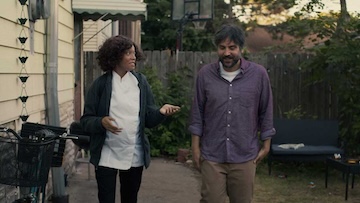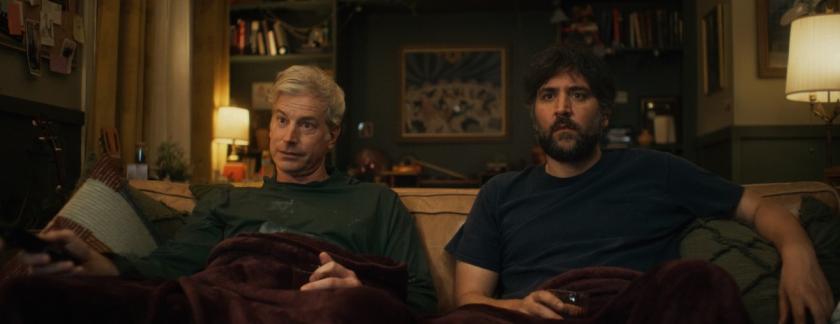Director Haroula Rose’s gentle, good-hearted new comedy-drama All Happy Families takes its title from the famous first sentence of Leo Tolstoy’s Anna Karenina: “All happy families are alike; each unhappy family is unhappy in its own way.”
There’s no discernible attempt on Rose's part to map her characters onto Tolstoy’s, but if we were to identify a potential analogue for Konstantin Levin, the moral centre of Anna Karenina, it would be Graham (Josh Radnor). A decent, introspective, socially awkward would-be actor and screenwriter, Graham inhabits the upper floor of his childhood home, having moved back in when his elderly parents, Roy (John Ashton) and Sue (Becky Ann Baxter), moved out (main picture: Rob Huebel and Josh Radnor as Will and Graham).
Where Levin spends his time pondering the meaning of life and encouraging his serfs to adopt modern European farming practices, Graham is happier smoking joints and munching cheese puffs, pausing the TV now and then to take an iPhone photo of the amusingly contorted face of his older, more successful brother, Will (Rob Huebel), who stars in the appropriately named soap Winsome Falls.
Will, who finances most of his family’s lives, has tasked Graham with renting out the bottom floor of the house, and one of the prospective tenants turns out to be an old friend (and unconsummated crush) of Graham’s, Dana (Chandra Russell).
Whilst renovating the house in preparation for Dana moving in, Graham vexes over the ethics of embarking on a landlord–tenant relationship with someone with whom he is emotionally involved. Meanwhile, for reasons he won’t reveal, Will flies in from LA with the intention of bunking down with Graham in what should have been Dana’s new apartment. And then their parents arrive, bickering and intervening and eager to squirrel out the truth about Will’s unexpected sojourn. Happy families, indeed (Pictured below: Chandra Russell, Josh Radnor). Rose uses this premise as a springboard to explore contemporary issues such as the complex stresses of modern family relations, and toxic masculinity. At her retirement party, Sue has been abruptly groped by her much younger boss, Jerry, and is struggling with his continued, unwanted advances and her need to conceal this from Roy.
Rose uses this premise as a springboard to explore contemporary issues such as the complex stresses of modern family relations, and toxic masculinity. At her retirement party, Sue has been abruptly groped by her much younger boss, Jerry, and is struggling with his continued, unwanted advances and her need to conceal this from Roy.
Roy is a gruff and emotionally undemonstrative man with a slight drinking problem and a more significant gambling addiction. Will’s lucrative TV gig, it transpires, is in danger due to his having been accused of inappropriate behaviour by the teenager who plays his on-screen daughter; it doesn’t bode well that Sue automatically assumes Will is guilty as charged.
The final member to join this happy family circle is Evie (Ivy O'Brien), Will’s daughter who has recently come out as trans. Will doesn’t seem to have any issue with Evie’s transition, but only because he’s narcissistically fixated on his own problems. Evie finds a more simpatico connection in Sue, who comes closest to being the film’s equivalent of Tolstoy’s Anna, and is one of the film's few unambiguously admirable characters, although even she isn’t lacking in abrasiveness. Then again, Anna Karenina never had to contend with parallel parking or legalised marijuana.
Baxter, who radiates charisma and solidity, steals most of the scenes she’s in. All the performances are strong, Huebel’s perhaps most of all: his character is an egomaniacal asshole, but Huebel also somehow imbues him with a genuine sense of caring about his family, particularly his brother. Russell is terrific, if underused: like a Ferrari confined to a 20mph zone.
If this all sounds like a lot of plot, it is. And Rose’s problem here is that the audience can’t be sure which storyline(s) we should invest in. Rose sets so many plates spinning that we never get a chance to properly examine what’s on any of them. This impedes both character development and the satisfactory resolution of plotlines. While the undercurrent of humour saves the film from the trap of self-seriousness, the overall effect is diffuse and confusing.
The handling of the trans issue is especially puzzling. In what would otherwise be a tender scene between grandmother and granddaughter, Evie tells Sue the reason that she’s here is that she wants Sue (who does not appear to be affluent) to lend her $30,000 “for affirmation surgery”, then says she’s only kidding. In the current cultural moment, when the US President has declared – on day one, in his Inaugural Address – that trans people simply do not exist, this feels like a quite flippant and unfortunately timed joke.
All Happy Families is suffused by an indie sensibility and the warm tones in which it’s filmed are attractive, if a little clichéd. But its scattergun approach and under-written script prevent it from cohering into more than the sum of its parts. Ultimately, it comes across as a noble failure – less like a movie than the pilot for a slow-burning TV series.
That longer format would have given the director more space to explore her characters and resolve some storylines. Rose says she wanted to address themes such as “Can people change, and how can it happen in a real and grounded way on film?” and “Do late bloomers stand a chance?”, and we do see these questions being asked. We just don’t seem to get any answers.















Add comment